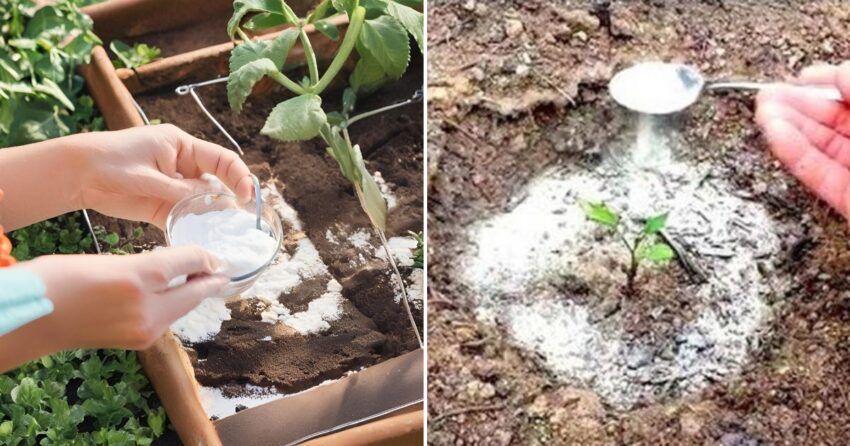Baking soda, or sodium bicarbonate, is a common household item that offers a variety of uses beyond the kitchen. In the realm of gardening, it holds several surprising benefits. Curious about what happens when you put 1 teaspoon of baking soda in your plants? Let’s dive into the science and practical applications of this humble compound and discover how it can enhance your gardening efforts.
The Science Behind Baking Soda
Baking soda is a mild alkaline substance with a pH of around 8.3. When dissolved in water, it can alter the pH balance of the soil or water solution. This shift in pH can influence various physiological processes in plants and impact pest control and disease prevention.
Benefits of Using Baking Soda in Gardening
- Fungal Disease Prevention
Baking soda is known for its antifungal properties. When mixed with water and applied to plants, it can help prevent and control fungal diseases like powdery mildew, black spot, and blight.
How to Use:
- Mix 1 teaspoon of baking soda with 1 quart of water.
- Add a few drops of liquid dish soap to help the solution adhere to the leaves.
- Spray the mixture on affected plants, covering both the top and bottom of the leaves.
- pH Adjustment
Certain plants prefer slightly alkaline soil. Baking soda can help raise the pH of acidic soil, making it more suitable for these plants.
How to Use:
- Dissolve 1 teaspoon of baking soda in a gallon of water.
- Water the plants with this solution once a month to gradually increase soil pH.
- Pest Control
Baking soda can act as a deterrent to some garden pests like aphids, spider mites, and ants. Its slightly abrasive texture can harm soft-bodied pests, and its alkaline nature can disrupt their life cycles.
How to Use:
- Mix 1 teaspoon of baking soda with a few drops of dish soap and a quart of water.
- Spray the solution on plants infested with pests.
- Weed Control
Baking soda can also be used as a natural weed killer. Its high sodium content can dehydrate and kill unwanted plants when applied directly.
How to Use:
- Sprinkle baking soda directly onto the weeds, avoiding contact with your desired plants.
Potential Risks and Precautions
While baking soda offers numerous benefits, it’s important to use it cautiously. Overuse or improper application can harm your plants. Here are some precautions to consider:
- Leaf Burn
Baking soda can cause leaf burn if applied in high concentrations or under direct sunlight. Always dilute properly and apply during cooler parts of the day, such as early morning or late afternoon.
- Soil Imbalance
Excessive use of baking soda can lead to an imbalance in soil pH, potentially harming plants that prefer acidic conditions. Monitor soil pH regularly if you’re using baking soda solutions.
- Avoid Overapplication
Using baking soda too frequently can lead to a buildup of sodium in the soil, which can be detrimental to plant health. Limit applications to once a month unless addressing a specific issue like fungal infections.
Real-Life Applications
Let’s look at a few scenarios where baking soda has proven beneficial for gardeners.
- Powdery Mildew on Roses
Roses are susceptible to powdery mildew, a fungal disease that causes white, powdery spots on leaves and stems. Regular applications of a baking soda solution can prevent and treat this condition, keeping your roses healthy and vibrant.
- Black Spot on Tomatoes
Tomato plants often suffer from black spots, which can reduce fruit yield and quality. Spraying a baking soda solution can help control this fungal issue and promote healthier plants.
- General Garden Maintenance
A periodic baking soda spray can act as a preventive measure against a range of common garden problems, ensuring that your plants stay robust and disease-free.
Conclusion
Incorporating 1 teaspoon of baking soda into your gardening routine can yield impressive benefits, from controlling fungal diseases and pests to adjusting soil pH. However, moderation and proper application are key to avoiding potential risks. By understanding the science and following best practices, you can harness the power of baking soda to enhance the health and productivity of your garden. Happy gardening!

